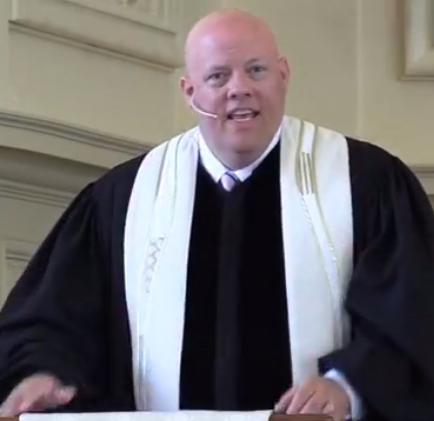A MESSAGE FROM THE REV. J.C. AUSTIN: Pride – a corrective reaction
We have now begun our summer preaching series around the theme of “A Good Word,” in which we are exploring what Scripture tells us about how to understand a particular word each week that has significance for our lives and faith and ministry as individual Christians and as a congregation.
Lindsey started us off last Sunday, appropriately enough, with the word “Grace,” which is where pretty much any theological conversation or consideration should begin for Christians! And, thanks to the excellent response to our invitation to submit words for consideration in sermons, we have enough “Good Words” to carry us through the Labor Day weekend! Thanks to all who responded, and we’re looking forward to exploring these words with you through the lens of Scripture throughout the summer.
There is one word that was not suggested that I want to explore briefly here, though. That word is “pride.” Earlier this week, a pastor friend of mine posted a message on her Facebook page that simply said, “Happy Pride, friends!” She was, of course, referring to the month of June, which is known as Pride Month for LGBTQ* people.
As you probably know, “Pride” is a celebration of LGBTQ identities, culture, and history in the month of June each year, and the post was simply a recognition of that. But what followed this innocuous post was a torrent of negative comments that ranged from outright hate against LGBTQ people to theological condemnations of my friend as a “false teacher” who is leading her congregation away from God through her commitment to LGBTQ inclusivity.
And within the latter were a number of posts arguing that Christians should not support LGBTQ Pride because “pride” itself is condemned as sin by the Bible. Now, I assume that we are all in agreement that hate of any kind is antithetical to the Christian gospel. But given the number of comments saying that we as Christians cannot support LGBTQ Pride because pride is inherently sinful, I want to address that word here as Pride Month unfolds and the word “pride” is so much in the air.
The traditional Christian understanding of the sin of pride is that it directs honor to oneself that rightfully belongs to God, and it has often been identified as the “root” of sin, in which we forsake God’s will and follow our own, instead.
Augustine sums this up well: “Pride is the beginning of sin. And what is pride but the craving for undue exaltation? And this is undue exaltation – when the soul abandons Him who to whom it ought to cleave as its end, and becomes a kind of end to itself” (City of God).
The problem, of course, is that this definition of pride as “undue exaltation” has nothing to do with LGBTQ Pride. I think we all actually know that not all forms of pride are sinful expressions of undue exaltation. When I am proud of my son for excelling at something, that is not undue exaltation: it is gratitude for the gifts he has been given and for his dedication in using them well and productively, as God intends all gifts to be used. Sinful pride would be replacing gratitude with undue exaltation: believing that he has greater inherent value to God or for society because of his innate characteristics, or racial identity, or gender, or so on.
LGBTQ Pride is hardly the sinful undue exaltation condemned by Augustine and almost all theological traditions in some form, including our own Reformed theological tradition, as well as Scripture itself. On the contrary, I would argue that this celebratory understanding of Pride is a corrective reaction to what we might call “undue denigration,” categorizing and treating LGBTQ people as “less than” in church or society simply because of their identities.
And for Christians, that is not only something we can support, but should. Because it is the insistence that LGBTQ people are beloved by God and should be accorded the same dignity and rights and opportunities as any human being. More than that, it recognizes that LGBTQ people have particular perspectives and experiences and contributions that enrich the church and our society and our world that should be recognized and celebrated with gratitude and appreciation, in part precisely because church and society have for so long treated LGBTQ people with its own form of sinful pride: displacing God’s love with human rejection and exclusion and persecution, and unduly exalting non-LGBTQ people in doing so.
So, I hope that with this theologically-informed understanding of the word “pride,” we can wish our LGBTQ members and friends and neighbors a “Happy Pride” this month, not in spite of our faith but because of it, as an expression of our love and our conviction that we are all beloved children of God together, as the first letter of John famously puts it: “Beloved, let us love one another, because love is from God; everyone who loves is born of God and knows God” (1 John 4:7-8).
Grace and Peace,
J.C.
* LGBTQ = “Lesbian, Gay, Bisexual, Transgender, Queer.” You may have seen other versions of this, and there is not a strict consensus on the best acronym to use, but Rev. Goudy of the Metropolitan Community Church of the Lehigh Valley, who spoke to us a couple of years ago about this, encouraged us to use this one as a good combination of clarity and inclusivity.

